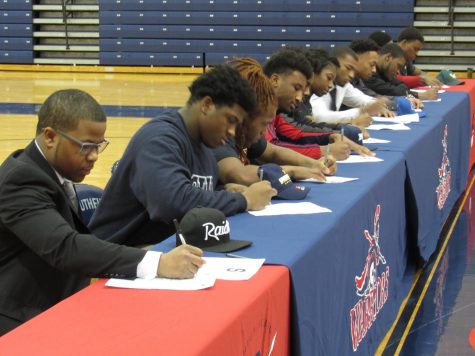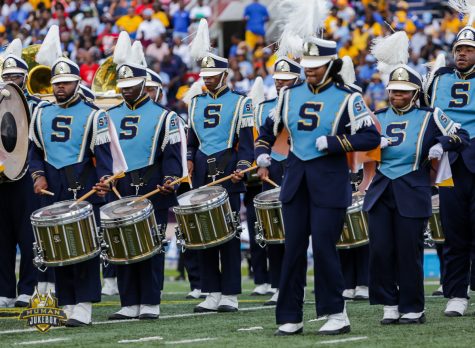District Eliminates Extra Credit
Students Must Earn Grades by Doing Assigned Class Work
Paper work: Senior Arron Williams (left) and DeRon Dennard complete an assignment on precision and accuracy for Bruce Shepard’s Physics class.
To prevent grade inflation, Southfield Public Schools has eliminated extra credit for its students, said Sonia Jackson, assistant principal of Southfield High School.
“They are trying to hold kids more accountable for their work,” said Jackson, who supports the policy change.
Biology teacher Craig Bonnington says he, too, will support the elimination of extra credit because it forces students to do their assigned work. “It’s a good incentive to do better,” Bonnington said.
Junior Turquoise Clark, however, is irritated by the change. “That’s not fair,” she said. “We need that (extra credit) for those students who are struggling.”
The policy change went into effect the beginning of the 2013-2014 school year, Jackson said.
“Having no extra credit will force kids to stay on top of their work,” said sophomore Ian Patterson
Junior Dante Humphrey said he was unaware of the policy change but predicts it will have a negative impact on students.
Most teachers have offered extra credit at some point during the school year for various reasons. Some teachers, such as former math teacher Vernon Burden, gave students a few extra credit points if they participated in the school’s canned food drive for needy families.
Others, such as Bonnington, have in the past added an extra credit question to the bottom of tests to reward students who paid extra close attention in class.
Still others such as English teacher Virna Hobbs-Calhoun gave extra credit to students who went to see the Great Gatsby movie after having read it in class.
Those practices are no longer permissible under the new guidelines.




















Lamont Hicks • Oct 9, 2013 at 1:23 pm
I don’t think that the extra credit system should be eliminated. Extra credit actually helps out a lot. There will be a time when a student won’t be doing so well and is going to need extra credit. It really doesn’t matter how much the extra credit is worth, the point is that it’s extra credit. I think if it wasn’t for this, I would be hurt sometimes.
Aaron Love • Oct 9, 2013 at 8:11 am
We should not be surprised if students’ grades go down. Extra credit is often times the turning point that either makes you or breaks you, so this isn’t wise.
Michelle Baker • Oct 8, 2013 at 8:51 pm
I personally believe that the absence of extra credit will allow various students to motivate themselves to do their work without an extra incentive. Students relied on extra credit to help boost their grade even if they had not completed assignments given to them. The absence of extra credit is a good idea for the encouragement of students striving for better grades.
Jeremy Kaigler • Oct 8, 2013 at 1:36 pm
The absence of extra credit probably won’t cause students to become more motivated unless their grades were soley fueled by the extra credit they were receiving. What will motivate students to donate to charity now?
Thailynn Tupper • Oct 8, 2013 at 1:29 pm
This will encourage students to stay on top of their work but at the same time this can be a bad thing. Students may stop participating in activites or fundraisers because that extra credit is not being provided. The extra credit was good for students not so well at test taking or just to get that extra bump up in a class that you may not be doing well in.
Arron • Oct 8, 2013 at 9:24 am
I disapprove. I was never really the one who used extra credit because I do my work. But this does put a student who wants to slightly improve their grade at a disadvantage.
ryan bailey • Oct 8, 2013 at 9:18 am
I agree that without extra credit students will have to step their game up, but for struggling students they will miss it.
Charles Murphy • Oct 8, 2013 at 9:02 am
With the extra credit being eliminated, it will force students to do their work and be studious and serious about school work. I believe it is a good idea because many students will have to take initiative and do their work as expected to pass their classes.